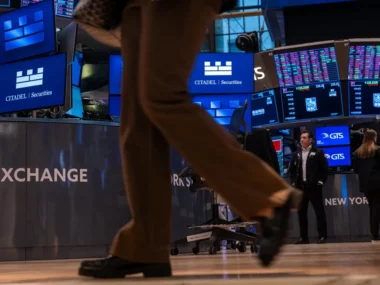The world faces many pressing challenges in 2025, but the U.S. economy isn’t one of them.
Fueled by resilient consumer spending, America’s strong recovery from the pandemic downturn extended through 2024.
Economic growth has repeatedly outperformed expectations, navigating through high interest rates and elevated inflation. Financial markets thrived, and while hiring slowed, layoffs stayed minimal.
As 2025 begins and the Trump administration assumes office, there are solid reasons for economic optimism.
“The U.S. economy, as it has for years, continues to move forward at a steady pace,” said David Kelly, chief global strategist at JPMorgan Asset Management.
No recession in sight
Remember those 2022 forecasts predicting an inevitable recession? Fortunately, it hasn’t materialized.
The Federal Reserve’s inflation-fighting measures slowed growth but caused far less damage than expected. Markets faced turbulence but remained intact.
While some weaknesses appeared in the job market, unemployment levels stayed comparatively low.
Unlike late 2021 and 2022, analysts reviewing the U.S. economy’s fundamentals now see no clear signs of an impending recession.
“A shock would be needed to push the economy into a recession,” Kelly noted, “and I don’t see any internal factors capable of doing that.”
However, external threats remain, such as the risk of a severe trade war.
Gas prices remain controlled.
Energy prices often carry the risk of triggering a recession. The sharp rise in gasoline prices above $5 per gallon in mid-2022 was a significant threat to the U.S. economy.
Fortunately, oil prices are much lower now. Concerns over supply disruptions in the Middle East or Russia have not materialized. Instead, supply has exceeded expectations, with the United States producing more oil than any other nation in history.

A person finishes pumping gas in Austin, Texas, on October 22, 2024.
GasBuddy forecasts an average gas price of $3.22 per gallon for 2025, representing the third consecutive year of price declines.
Lower gas prices are expected to boost consumer confidence and contribute to more moderate inflation rates.
Wages are outpacing price increases.
Many Americans are frustrated by rising costs for groceries, car insurance, and rent compared to pre-COVID times. While prices may not return to 2019 levels, the rate of increase has slowed significantly.
In addition, wages are growing at a faster pace than prices, leading to real wage gains for Americans. If this trend continues, it could help them adjust to higher costs and improve their perception of the cost of living.
Fed Chair Jerome Powell stated in December, “The best we can do for them is to bring inflation down to its target and keep it there, so people experience substantial real wage increases. That’s what will restore confidence in the economy, and that’s our goal.”
The Federal Reserve has reduced interest rates.
To combat inflation, the Federal Reserve raised interest rates to their highest levels in decades, a move not seen since the 1980s. This strategy increased borrowing costs for mortgages, car loans, credit cards, and small business loans.
With inflation now under control, the Fed has lowered rates in three consecutive meetings.
However, there is still significant uncertainty about whether further rate cuts will occur in 2025. Additionally, mortgage borrowing costs have not yet decreased.
Nevertheless, the Fed’s decision to begin reducing rates is a positive sign for the economy and is expected to support growth in the coming months.

The seal of the US Federal Reserve Board of Governors was displayed in Washington, DC, on December 31, 2024.
Pro-business policies
President-elect Donald Trump is highly focused on enhancing the US economy.
While there is considerable debate over the potential effects of Trump’s agenda, particularly on inflation, some economists are optimistic about his plans for tax reform and regulatory cuts.
Trump has enlisted Elon Musk to co-lead a new Department of Government Efficiency, an advisory board aimed at reducing wasteful spending and excessive regulations.
Glenn Hubbard, former dean of Columbia Business School and a former economic adviser to President George W. Bush, expressed optimism about the initiative, noting that while it may not seem glamorous, significant productivity gains often stem from such efforts. He also highlighted the potential benefits of streamlining financial regulations and accelerating the permitting process, which has hindered construction in the US.
Tariffs, deportations and Fed fights
There are always risks that could quickly disrupt the economic outlook, such as a potential port strike in mid-January.
Trump’s trade policies continue to raise concerns among many economists, who worry that they could lead to inflation and reduce business investment.
Stephanie Roth, chief economist at Wolfe Research, expressed concern about the tariffs, though she assumes Trump won’t implement all of the proposed tariffs, and that any tariffs imposed may not take effect until late 2025.
However, if Trump were to follow through on all proposed tariffs, Roth believes economic growth could be halved, potentially dropping to just 1% in 2025, excluding the additional damage from retaliatory tariffs.
She warned that if this happens, recession risks would become much more likely.
Additionally, Trump’s plan for mass deportations could lead to worker shortages in critical industries, which might push wages and prices higher.
Investors are also on edge about the possibility of a conflict between Trump and Federal Reserve Chair Jerome Powell, whom Trump appointed.
Wolfe noted that any attempts to undermine the Fed’s independence could harm market sentiment and create a self-fulfilling negative impact.

Tractor trailers lined up at the Ysleta-Zaragoza International Bridge port of entry on the US-Mexico border in Juarez, Chihuahua state, Mexico, on December 20, 2024.
Wild cards
Another emerging concern is the potential for a significant downturn in financial markets, which were strong for much of 2024 but ended the year weakly.
There are growing worries about the high valuations in certain market sectors, particularly Big Tech, and how the gains have been disproportionately concentrated among the Magnificent Seven companies.
A sharp market correction, or even a bear market, could undermine consumer and business confidence, which would negatively affect the broader economy.
Additionally, unpredictable risks like cyberattacks, pandemics, and natural disasters are more difficult to prepare for.
JPMorgan’s Kelly noted, “The lessons of the 21st century are ‘Don’t worry about the things you expect. Worry about the things you don’t expect.’”











